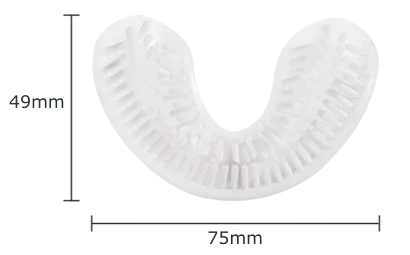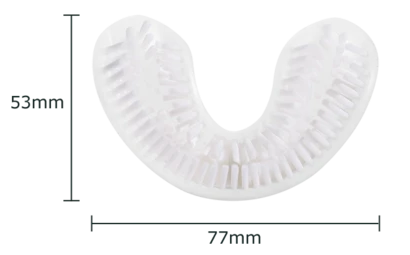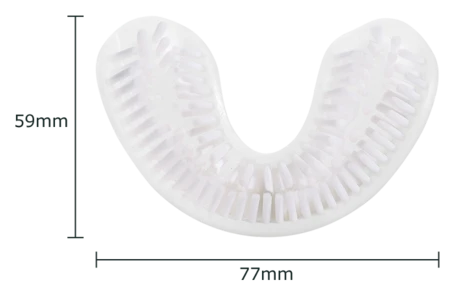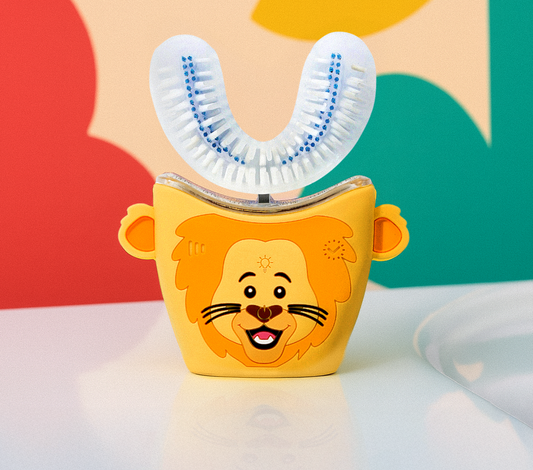
Toothbrush for Autism - Helping Kids with Autism Keep Dental Problems at Bay
Autism spectrum disorder (ASD) is a condition that affects a child's behavior, communication, and social skills.
If you're a parent of a child with ASD, we’re here to help.
In this blog, you'll learn why kids with special needs are prone to teeth and gum disease—and what you can do to ease your kid's dental struggle.
Why do Children with ASD Have Oral Health Problems?
Sensitive Teeth
It’s not uncommon for kids of all ages to dislike brushing their teeth, some even get overwhelmed by the jarring noise from electric toothbrushes. This is especially true if your special needs child has sensory issues. For example, kids with autism struggle with brushing their teeth.
They may be hyposensitive, meaning they have little to no sensation in their mouth. This makes them anxious—if not reluctant—to brush their teeth.
Or perhaps, your child is hypersensitive. They have an increased sensation in the mouth, making the activity of brushing their teeth unpleasant.
Given these sensory issues combined with ASD kids being easily upset by minor changes, teeth brushing can be a huge obstacle for parents and caregivers to overcome.
Instead of wrestling with your child to clean their teeth for a full two minutes, it can be tempting to stop at the one-minute mark.
⭐️ Toothy Tip: To avoid this, many caregivers use a soft and gentle toothbrush like the AutoBrush that can provide a complete cleaning in just 30 seconds.
Food Intake
Children with autism can be picky eaters. They may prefer sugary food, which can lead to tooth decay without proper brushing.
In addition, many parents opt to praise good behavior with a treat. In fact, a recent study found that 67% of parents admitted that they gave their kids snacks as a reward.
Medication
The medications that your special needs child takes can also compound their dental problems.
For example, many ASD drugs have dry mouth, gingivitis, or gum disease as a side effect. If left untreated, these symptoms can lead to oral health problems and require dental care.
What dental problems do autistic children face?

Tooth Decay
Tooth decay, also known as caries, is caused by bacteria that damage the enamel and often leads to cavities.
Many ASD children experience tooth decay as a consequence of dry mouth. It's a known side effect of the following medications:
- Methylphenidate, a stimulant given for hyperactivity
- Carbamazepine and Valproate, anticonvulsants that manage aggression
- Olanzapine and Risperidone, antipsychotics used for aggressive behavior
- Fluoxetine and Sertraline, antidepressants that help with repetitive behavior
Gum Disease
Gingivitis is characterized by swelling, redness, and irritation of the gums. It's often caused by plaque and can be avoided with proper dental hygiene. However, children with autism tend to pick at their gums, eventually leading to gingivitis.
Additionally, some common ASD medications irritate the gums. These include Olanzapine, Risperidone, Fluoxetine, and Sertraline.
Bruxism
About 25% of kiddos with sensory issues have bruxism, the repeated grinding of teeth or clenching of the jaw lead to facial pain and headaches. This continue pressure can wear their teeth down and cause sensitivity or pain.
Dental Trauma or Injury
As mentioned above, children with autism characterize hyperactivity. Some even develop epilepsy or a seizure disorder by the time they reach adolescence
If not in a safe environment, accidents may happen that result in a loss or chipped tooth.
How can parents prevent dental problems in children with autism?

Promote Regular Brushing
Try your best to brush your child's teeth at least twice a day.
As this can be a struggle, parents should purchase a toothbrush specially made for this particular need.
The best example of this is AutoBrush, a soft-bristled mouthpiece toothbrush. It comes in colorful designs that kiddos—with or without autism—love.
You can even use this as an opportunity to teach your child to be independent.
Practice Preventive Dental Care
Prevention is better than the cure.
Visit your dentist regularly to better prevent plaque build-up and caries
If needed, your dentist may also prescribe your special needs child with chlorhexidine, an antibacterial mouthwash can also help prevent gum disease.
Increase Water Intake
As previously mentioned, medications can lead to a dry mouth and other dental issues. To combat this, be sure that your child drinks water regularly, especially during mealtimes or after taking medications.
How do you help a child with sensory issues to brush their teeth?

Set a Routine
Children with autism need to follow a routine. They get upset whenever a minor thing changes.
Because of this, you should set a brushing schedule for your kiddo. Working this into their daily routine would lessen their chances of throwing a fit.
Lead by Example
Kiddos with autism benefit from the tell-show-do approach.
The best way to do this is to be a model. It's all about showing them how fun and fast brushing your teeth can be with AutoBrush.
Reward Your Kid for Good Brushing Behavior
Rewarding brushing will motivate your kiddo to keep up the excellent work.
Toothy Tip: A sticker charts is great option (and alternative from treats) to praise proper brushing behavior.
How AutoBrush helps children with sensory issues
AutoBrush is dedicated to making brushing accessible and easier for all people -- including individuals that struggle with disabilities or sensory issues. The AutoBrush enables individuals to get a stellar clean in only 30 seconds. Best part? The technique needed is easier that brushing with a manual toothbrush.













































